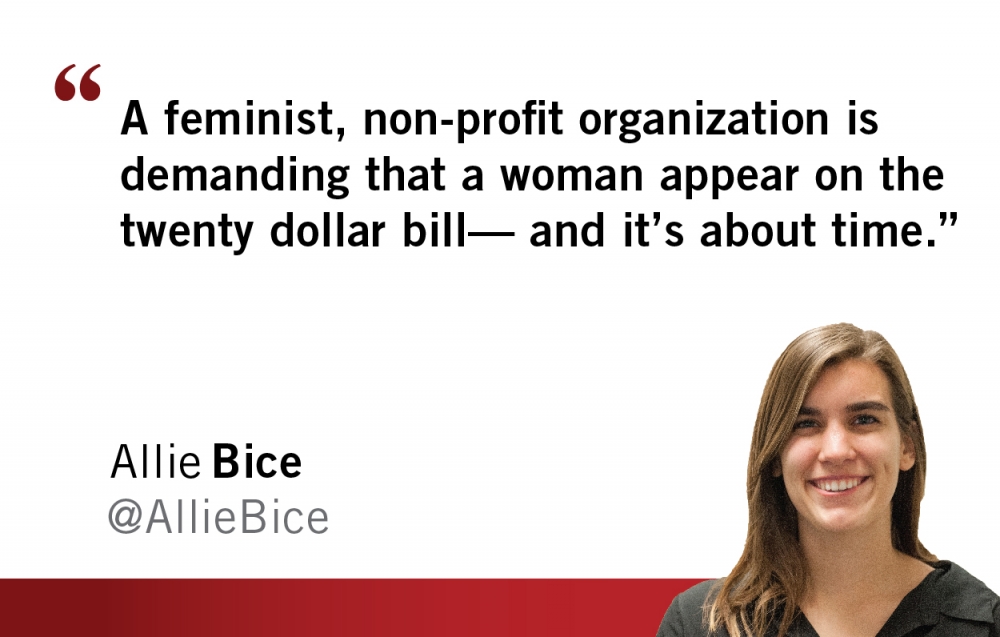Have you ever taken a good look at the money in your wallet? If you look at the faces of each bill and coin, you’ll begin to notice a pattern — every form of American currency features faces of old, white men.
A nonprofit organization called Women on 20s has sparked attention with their new initiative to feature a woman on the $20 bill by the year 2020. The year 2020 will be the 100-year anniversary of the 19th amendment, which gave women the right to vote. (Yes, it has only been 100 years).
The organization’s homepage features a video of children searching through a pile of bills and attempting to find one with a woman’s face on it. After minutes of searching, each child in the video is unable to find such a bill.
“It’s crazy that there are no girls on the money!” a young boy yells.
“If a girl was on the money, it would be fair”, another said.
“Do people think that girls are not important?” a little girl asks shyly.
If this little girl looks at a few bills and ponders that idea, imagine how many other girls are asking the same question. There’s something wrong here. Women are important. Women play a vital role in America’s history, and they deserve equal recognition for their hard work. It’s about time we put a woman on the American dollar.
There have been several attempts to put women on currency in the past. Susan B. Anthony was initially the first woman to be on American coinage. Her face was plastered on the $1 silver coin, but the coin’s success failed due to its size and constant mix up with the quarter. In 2000, Congress revamped the coin and placed Sacagawea on the newly gold $1 coin. Both coins never saw popular use due to flaws in design. Now that we have learned from those mistakes, 2015 is the year we feature a woman on paper currency.

Although eliminating Andrew Jackson — of all the old, white men on U.S. currency — is a controversial topic for some, replacing him with a woman seems like the right way to go. On its site, Women on 20s explains that due to his involvement with the Trail of Tears and his distaste for the central banking system, Jackson should not stay on the $20 bill. Among those things, Jackson also preferred silver and gold coins instead of paper currency, so it’s ironic that he — of all the old, white men— is on the $20 bill.
The site leaves it to the public to decide which woman they feel is best appropriate to grace the new $20 bill. They list 15 potential contenders, including Rosa Parks, Eleanor Roosevelt, Clara Barton, Harriet Tubman and Susan B. Anthony. Some other candidates are Alice Paul, an accomplished lawyer and activist who headed the National Woman's Party, Frances Perkins, who was the first woman U.S. cabinet member, and even Shirley Chisholm, who was the first African-American woman elected into Congress.
Before you think to yourself that the list is missing amazing candidates like Beyoncé, Meryl Streep or Angelina Jolie, we also need to understand the rules and regulations of printing portraits on paper money. According to U.S. code, Title 31, Section 5114, in order to have their portrait on American currency, the person must be deceased for at least two years and recognizable to the general public.
The faces on American money haven’t changed since the 1920s. Let’s accurately show what America is about — diversity and inclusivity. Let’s properly acknowledge the hard work of women in the past. If the 15 female contenders were printed on currency, their names and accomplishments would be more recognized. Let’s face it, you probably know more about Benjamin Franklin than Sojourner Truth. We need to show future generations that women were and and continue to be crucial to the success of this country.
Let’s stop faultily drilling young girls and boys with this idea that men are superior. Besides, all we’re asking for is one bill.
Vote for the future face of the $20 bill at womenon20s.org.
Reach the columnist at ambice@asu.edu or follow @AllieBice on Twitter.
Editor’s note: The opinions presented in this column are the author’s and do not imply any endorsement from The State Press or its editors.
Want to join the conversation? Send an email to opiniondesk.statepress@gmail.com. Keep letters under 300 words and be sure to include your university affiliation. Anonymity will not be granted.
Like The State Press on Facebook and follow @statepress on Twitter.




